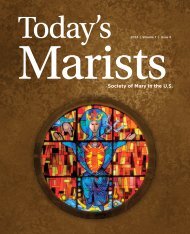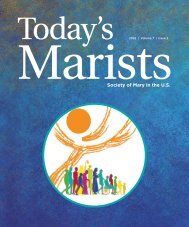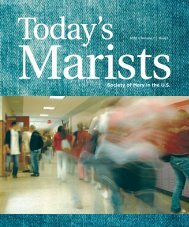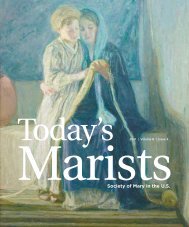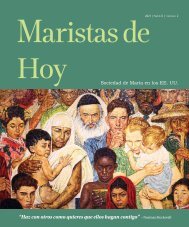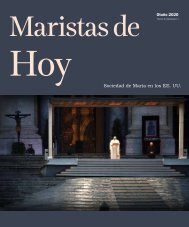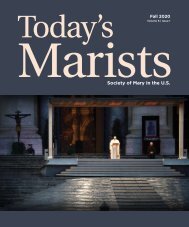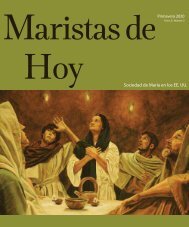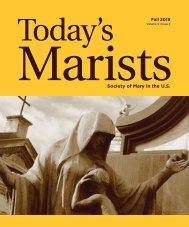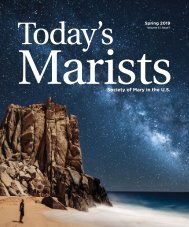Today's Marists 2024 Volume 8, Issue 2
You also want an ePaper? Increase the reach of your titles
YUMPU automatically turns print PDFs into web optimized ePapers that Google loves.
have anointed your head with oil?” Instead, Simon’s inner narrative<br />
was to blame. Simon blames Jesus for not knowing this woman was<br />
a sinner, blames the woman for her sinful ways, not ever looking<br />
inside himself.<br />
What if we spent more time trying to change our inner narratives?<br />
First, it is humbling for us to acknowledge that we have one! Then<br />
we can pause, pausing before we blame another government,<br />
blame another political party, blame another leader or blame<br />
another colleague or family member. We can look instead at how<br />
we can be better - then vow to be better!<br />
In today’s contentious times, in my experience, any sign or<br />
effort at reconciliation for young people can help change their<br />
confusing inner narratives. Such reconciliation is accessible for<br />
our students at Marist School through an act as straightforward as<br />
the Sacrament of Reconciliation. We are led by the <strong>Marists</strong> who are<br />
mindful of Fr. Colin’s words that “the sacrament of penance is a<br />
source of consolation and strength,” (A Founder Speaks, #7, 3). The<br />
<strong>Marists</strong> share a heart to be “instruments of God’s mercy working<br />
to help others taste the boundless love of the Lord.” (US Province<br />
Statement of Identity, 2013)<br />
During Lent we held a Reconciliation Service for the students - an<br />
intentional time in the school day to pause and avail ourselves<br />
of the Sacrament of Reconciliation. What a gift this Sacrament<br />
is! Instead of going to class, students were invited to the Chapel<br />
to sit quietly. Music was played and priests were available for<br />
Confession. These students are young - beginners - still learning<br />
to navigate their inner dialogue. The Sacrament of Reconciliation<br />
allows us to practice what I learned in Outdoor Ed class – rather<br />
than blame, be willing to apologize and evaluate what you have<br />
done wrong, and vow to be better!<br />
I saw nervous students in the chapel that day - unsure of the right<br />
words to say. They pulled me aside to ask questions like, “What<br />
if I forget to say a sin?” “What if I do not remember the Act of<br />
Contrition?” or “What if I am not Catholic?”<br />
What a gift it was to practice this together! I spent the hour<br />
practicing with students, encouraging them and allowing them<br />
time with the extraordinary Marist priests who shepherded them<br />
through the Sacrament and the ability to bask in God’s grace.<br />
We join other Marist schools in taking intentional time to pause, to<br />
say out loud – “I’m sorry, this is what I have done wrong, and I will<br />
be better! “<br />
So many times we expect that we should be perfect, and we expect<br />
others around us to be perfect. What if we approached our days<br />
like these students at Reconciliation willing to change their inner<br />
narrative? What if we listened to the words of Christ in the parable<br />
and simply heard, “Your sins are forgiven.” What weight would be<br />
lifted from our souls?<br />
I often think about my time in the river. I did not like flipping the<br />
canoe. I did not like getting wet. I did not like hopping back in the<br />
canoe, but I liked the time on the water. I liked the time to be in the<br />
world with other people navigating the rapids, and I loved hearing,<br />
“We will do better next time.” It became a rally cry on that trip.<br />
When my Outdoor Ed class returned to school, whenever we<br />
messed up something, received a low grade on a test or just fell<br />
short of expectations - we would laugh and say, “We’ll do better<br />
next time!” We learned the way of reconciliation on the waters!<br />
Reconciling the Sacrement, continued from page 19<br />
students to come and wait for a station to open up after which they<br />
go into the room for confession.”<br />
Juan Pablo Turrubiartes is a seventh grader at NDP. He first received<br />
the Sacrament of Reconciliation at St. Mary of the Hills in Rochester<br />
Hills, Michigan. Since then, he has gone to confession a number of<br />
times at the NDP-organized service at St. John Fisher.<br />
“I believe the Sacrament of Reconciliation is where you go and<br />
talk with a priest and reflect over your sins,” he said. “You then are<br />
pardoned and given advice on what you can do to avoid your sins in<br />
the future.”<br />
He adds that for him, it is like you are talking with Jesus and asking<br />
Him for forgiveness.<br />
“He will always forgive you as long as you are truly sorry. When I<br />
participate in this sacrament, while I may have failed God and his<br />
mission for me, I feel grateful for the opportunity to reunite with God<br />
and continue his mission for me.”<br />
He says sometimes he is a bit nervous before meeting with the priest.<br />
“But when I talk it out with the priest, I feel much calmer - as if God<br />
just came in and forgave me with his unending grace and mercy,”<br />
he said.<br />
Natalie Esseily, a sixth grader at NDP, says that reconciliation, the<br />
opportunity to be forgiven, is a gift that some people are sometimes<br />
too afraid to unwrap.<br />
“But I feel very blessed to be able to participate in this merciful<br />
event,” she said. “Many people do not understand what a wonderful<br />
opportunity it is to convert from a life of sin to a life of following the<br />
tenets of God and to renew your commitment to become a better<br />
follower of Jesus.”<br />
The Marist Way<br />
In addition, Lawrence remains focused on tying the Sacrament of<br />
Reconciliation to the school’s Marist mission.<br />
“One of the things we talk about with our young people especially<br />
during Lent, is that Marist sense of humility,” she said. “Father Jim<br />
Strasz, SM, defines that as being comfortable in your own skin. You<br />
know, being authentic. He’ll ask them ‘how can you be authentic<br />
if you’re wearing a mask? And what mask do you need to let go of<br />
today?’”<br />
Lawrence also said one of the elements that she and her team brings<br />
into discussions with students on the Sacrament of Reconciliation is<br />
how they can think, feel, judge and act like Mary in all things.<br />
“What does that look like? How am I doing that? Am I a person that is<br />
thinking about what is best for all? What are my values? Am I making<br />
good choices for myself? Am I someone other people can rely on to<br />
make good choices and be someone who’s going to lift somebody<br />
else up and not bring somebody else down? When have I brought<br />
someone else down? Can I let go of that now?<br />
“But it’s always within that Marist lens and Marist framework,” she<br />
said. “It’s always infusing our Marist values and who we are. We focus<br />
on this in appropriate ways at each grade level. We focus on this with<br />
the middle school, and we focus on these areas with the high school<br />
on a much deeper level.<br />
“We tell our students that they will get closer to God in the process<br />
of reconciliation, knowing that God is a forgiving, merciful God, and<br />
that we have to learn to become more like Him.”<br />
<strong>Volume</strong> 8 | <strong>Issue</strong> 2 21




